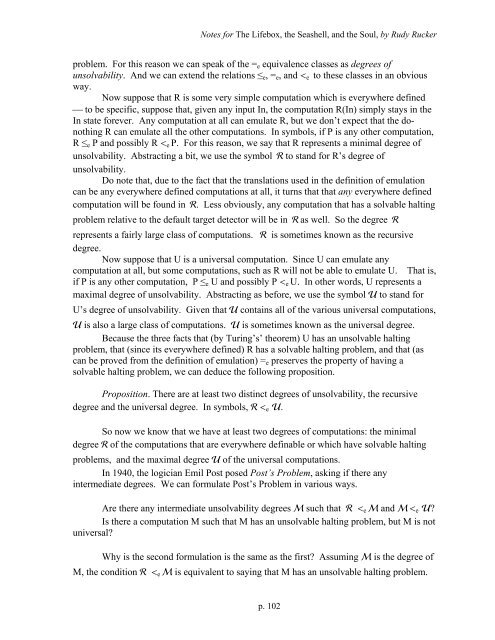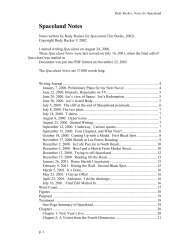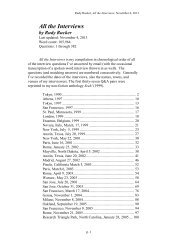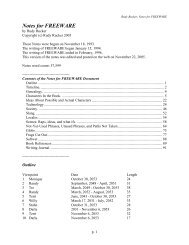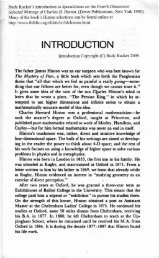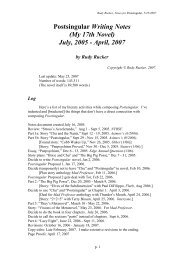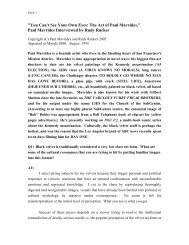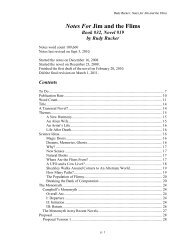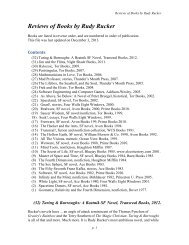Notes for the Lifebox, the Seashell, and the Soul - Rudy Rucker
Notes for the Lifebox, the Seashell, and the Soul - Rudy Rucker
Notes for the Lifebox, the Seashell, and the Soul - Rudy Rucker
Create successful ePaper yourself
Turn your PDF publications into a flip-book with our unique Google optimized e-Paper software.
<strong>Notes</strong> <strong>for</strong> The <strong>Lifebox</strong>, <strong>the</strong> <strong>Seashell</strong>, <strong>and</strong> <strong>the</strong> <strong>Soul</strong>, by <strong>Rudy</strong> <strong>Rucker</strong><br />
problem. For this reason we can speak of <strong>the</strong> = e equivalence classes as degrees of<br />
unsolvability. And we can extend <strong>the</strong> relations ≤ e , = e , <strong>and</strong> < e to <strong>the</strong>se classes in an obvious<br />
way.<br />
Now suppose that R is some very simple computation which is everywhere defined<br />
⎯ to be specific, suppose that, given any input In, <strong>the</strong> computation R(In) simply stays in <strong>the</strong><br />
In state <strong>for</strong>ever. Any computation at all can emulate R, but we don’t expect that <strong>the</strong> donothing<br />
R can emulate all <strong>the</strong> o<strong>the</strong>r computations. In symbols, if P is any o<strong>the</strong>r computation,<br />
R ≤ e P <strong>and</strong> possibly R < e P. For this reason, we say that R represents a minimal degree of<br />
unsolvability. Abstracting a bit, we use <strong>the</strong> symbol R to st<strong>and</strong> <strong>for</strong> R’s degree of<br />
unsolvability.<br />
Do note that, due to <strong>the</strong> fact that <strong>the</strong> translations used in <strong>the</strong> definition of emulation<br />
can be any everywhere defined computations at all, it turns that that any everywhere defined<br />
computation will be found in R. Less obviously, any computation that has a solvable halting<br />
problem relative to <strong>the</strong> default target detector will be in R as well. So <strong>the</strong> degree R<br />
represents a fairly large class of computations. R is sometimes known as <strong>the</strong> recursive<br />
degree.<br />
Now suppose that U is a universal computation. Since U can emulate any<br />
computation at all, but some computations, such as R will not be able to emulate U. That is,<br />
if P is any o<strong>the</strong>r computation, P ≤ e U <strong>and</strong> possibly P < e U. In o<strong>the</strong>r words, U represents a<br />
maximal degree of unsolvability. Abstracting as be<strong>for</strong>e, we use <strong>the</strong> symbol to st<strong>and</strong> <strong>for</strong><br />
U’s degree of unsolvability. Given that contains all of <strong>the</strong> various universal computations,<br />
is also a large class of computations. is sometimes known as <strong>the</strong> universal degree.<br />
Because <strong>the</strong> three facts that (by Turing’s’ <strong>the</strong>orem) U has an unsolvable halting<br />
problem, that (since its everywhere defined) R has a solvable halting problem, <strong>and</strong> that (as<br />
can be proved from <strong>the</strong> definition of emulation) = e preserves <strong>the</strong> property of having a<br />
solvable halting problem, we can deduce <strong>the</strong> following proposition.<br />
Proposition. There are at least two distinct degrees of unsolvability, <strong>the</strong> recursive<br />
degree <strong>and</strong> <strong>the</strong> universal degree. In symbols, < e .<br />
So now we know that we have at least two degrees of computations: <strong>the</strong> minimal<br />
degree of <strong>the</strong> computations that are everywhere definable or which have solvable halting<br />
problems, <strong>and</strong> <strong>the</strong> maximal degree of <strong>the</strong> universal computations.<br />
In 1940, <strong>the</strong> logician Emil Post posed Post’s Problem, asking if <strong>the</strong>re any<br />
intermediate degrees. We can <strong>for</strong>mulate Post’s Problem in various ways.<br />
Are <strong>the</strong>re any intermediate unsolvability degrees such that < e <strong>and</strong> < e ?<br />
Is <strong>the</strong>re a computation M such that M has an unsolvable halting problem, but M is not<br />
universal?<br />
Why is <strong>the</strong> second <strong>for</strong>mulation is <strong>the</strong> same as <strong>the</strong> first? Assuming is <strong>the</strong> degree of<br />
M, <strong>the</strong> condition < e is equivalent to saying that M has an unsolvable halting problem.<br />
p. 102


